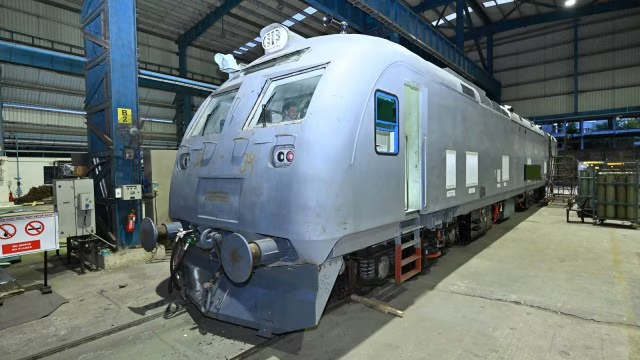



Indian Railways has tested the first hydrogen-powered coach at its Integral Coach Factory in Chennai. The project involves converting existing diesel power cars into hydrogen fuel cell-powered traction systems and establishing a hydrogen storage facility in Jind, Haryana. The train will operate between Jind and Sonepat stations, covering 356 km daily.

Copyright infringement not intended
Picture Courtesy: INDIAN EXPRESS
Indian Railways tested the first hydrogen-powered coach at its Integral Coach Factory (ICF) in Chennai.
Northern Railway zone started the hydrogen-powered coach project in 2020-21. It comprises two key components:
The total cost of this project is approximately Rs. 136 crore. The Research Design & Standards Organisation (RDSO) of Indian Railways is responsible for the primary design, validation, and testing phases.
The initial plan involves operating the hydrogen train between Jind and Sonepat stations in Haryana, covering two round-trips spanning 356 km daily. The Jind facility will have a hydrogen storage capacity of 3,000 kg.
Hydrogen trains use hydrogen fuel cells to generate electricity.
Germany launched the world's first commercial hydrogen-powered passenger train in 2018.
Hydrogen is highly flammable, can easily catch fire or explode if not handled properly.
Storing hydrogen at high pressure and ensuring its safe transfer requires specialized equipment and strict protocols.
The PESO (Petroleum and Explosives Safety Organization) Standards regulate the storage and handling of hydrogen. PESO operates under the Department for Promotion of Industry and Internal Trade (DPIIT).
Conducted CFD Studies (Computational Fluid Dynamics) to predict how hydrogen might behave in worst-case scenarios, such as a leak.
The trains are equipped with various sensors for: Leak Detection, Flame Detection, Temperature Detection
The system includes Pressure Relief Valves to release excess pressure safely and Scientifically Designed Ventilation to prevent hydrogen from accumulating.
TUV-SUD of Germany, conducted an independent safety audit of the system, which assures high safety standards.
Must Read Articles:
Green Hydrogen Plant Initiatives in India
Source: INDIAN EXPRESS
|
PRACTICE QUESTION Q. Examine the opportunities and challenges associated with the widespread adoption of hydrogen as a clean fuel in India's transport sector. 150 words |
A hydrogen-powered train uses hydrogen fuel cells to generate electricity, which then powers the train's motors, emitting only water vapor as a byproduct.
Hydrogen combustion or fuel cell reactions produce zero greenhouse gas emissions, significantly reducing air pollution and carbon footprint compared to diesel.
Key challenges include the high cost of hydrogen production, safe storage and transportation due to its flammability, and establishing a widespread refueling infrastructure.






© 2026 iasgyan. All right reserved